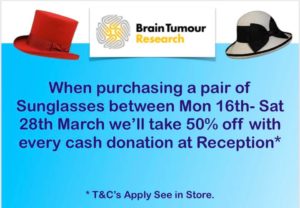World Glaucoma Week is an annual awareness week aimed at educating people on glaucoma, helping us all be better equipped at spotting and treating glaucoma in its early stages. In aid of assisting in the goal of getting everyone informed, we’ve put this article together to help you spot the symptoms.
“The goal is to alert everyone to have regular eye (and optic nerve) checks in order to detect glaucoma as early as possible.”
Glaucoma shows itself in several forms and is quite a complicated disease, but essentially it causes damage to the optic nerve and can result in vision loss. There are two common forms of glaucoma; open-angle glaucoma (POAG) and angle-closure glaucoma (ACG).
Open-Angle Glaucoma (OAG)
This form of glaucoma is often referred to as the sneak thief of sight because it often shows no symptoms until significant vision loss has already begun.
OAG develops very slowly, often over many years. There may be a loss of peripheral vision at first, but this can be missed because sharpness and clarity of vision is maintained.
OAG can, however, be detected during vision tests. This makes it especially important to keep up with regular eye tests, for early detection of glaucoma where it might otherwise not be noticed.
Angle-closure glaucoma (ACG)
Angle-closure glaucoma has more detectable symptoms. In ACG, the angle is closed in multiple areas, which leads to eye pressure, and optic nerve damage following from that.
Symptoms of angle-closure glaucoma include:
- Hazy/blurry vision
- You may see rainbow-coloured circles around bright lights
- Head and eye aches
- Nausea/vomiting (often accompanying eye pain)
- Vision loss
Although the symptoms of ACG are much more detectable, damage occurs very quickly. So, if you notice any symptoms, make an appointment with your optometrist straight away.
Detecting glaucoma early is the best possible method of slowing down the effects, so attending regular check-ups is very important. To book an appointment, or if you have any concerns or question regarding your eye health, please do get in touch at 01628 663055.
This week, we’re running a special offer in support of Brain Tumor Research. If you would like to help out, then do pop in.



